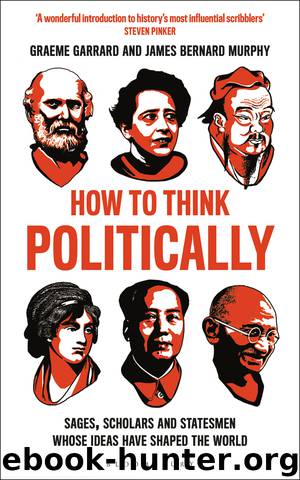How to Think Politically by James Bernard Murphy

Author:James Bernard Murphy
Language: eng
Format: epub
Publisher: Bloomsbury Publishing
18
James Madison: The Founder
After the American Revolution, the independent colonies were loosely united under the Articles of Confederation (1781). But this fledgling national government was not able to raise taxes, promote interstate trade or protect the new states from foreign aggression. Leaders from the various states agreed to organize a new and stronger national government, calling for a US Constitutional Convention in 1787.
To prepare for this upcoming convention, James Madison, a Virginia delegate, devoted himself to learning all he could about federal and republican governments. He wrote to his best friend and political ally, Thomas Jefferson – who was serving as an American delegate to the court of France – to request some treatises on ancient and modern federal republics, ‘especially by Greek and Roman authors’. Jefferson scoured the bookstalls of Paris, shipping 197 books, mostly in French, to Madison in Virginia.
Madison’s reputation as the ‘father of the constitution of the United States’ and, more generally, as the greatest theorist and practitioner of constitutional design in history, rests upon his deep learning. Unlike most great political thinkers, however, Madison combined prodigious book-learning with wide experience as a politician – making him a philosopher among statesmen and a statesman among philosophers. He followed in Jefferson’s footsteps through political office from the Virginia state legislature to the Continental Congress and from Secretary of State to President of the United States. Although he lacked Jefferson’s soaring rhetoric (‘all men are created equal’), Madison tempered Jeffersonian ideals of popular government with both greater realism about human nature and keener insights about institutional dynamics. Jefferson, for example, wanted each generation to write its own constitution. What does rule of the people mean if the people are governed by the dead? Madison insisted, by contrast, that healthy democratic politics required a fixed framework of basic law. Changing the constitution frequently would be like changing the rules of a game in the middle of play, undermining the fairness of democratic competition for power. Madison’s contributions to The Federalist Papers – a collection of essays explaining and defending the proposed new constitution – are what make it America’s greatest contribution to the history of political thought.
At the College of New Jersey (now Princeton University), the young Madison acquired an Augustinian pessimism about human nature from his teacher John Witherspoon, a Calvinist Christian from Scotland. Augustine, you will recall, has been called the first political realist because of his view of radical human evil – a tendency to selfishness that may be tempered but never eliminated by upbringing or education. Because of this radical human evil, ‘power tends to corrupt, and absolute power corrupts absolutely’, in the later words of Lord Acton. What this means is that no set of rulers – no matter how ‘virtuous’ – can be entrusted with plenary political power. Echoing Augustine, Madison famously said ‘If men were angels, no government would be necessary’. Appraising Madison’s institutional machinery for controlling the arbitrary exercise of power, Immanuel Kant claimed that a well-designed constitution could work even with a ‘race of devils’.
Download
This site does not store any files on its server. We only index and link to content provided by other sites. Please contact the content providers to delete copyright contents if any and email us, we'll remove relevant links or contents immediately.
| Chakras | Gandhi |
| History | Rituals & Practice |
| Sacred Writings | Sutras |
| Theology |
Fingersmith by Sarah Waters(2523)
Kundalini by Gopi Krishna(2167)
Wheels of Life by Anodea Judith(2128)
Indian Mythology by Devdutt Pattanaik(1928)
The Bhagavad Gita by Bibek Debroy(1915)
The Yoga of Jesus: Understanding the Hidden Teachings of the Gospels by Paramahansa Yogananda(1840)
Autobiography of a Yogi (Complete Edition) by Yogananda Paramahansa(1805)
The Man from the Egg by Sudha Murty(1796)
The Book of Secrets: 112 Meditations to Discover the Mystery Within by Osho(1656)
Chakra Mantra Magick by Kadmon Baal(1633)
The Sparsholt Affair by Alan Hollinghurst(1578)
Gandhi by Ramachandra Guha(1519)
Sparks of Divinity by B. K. S. Iyengar(1516)
Avatar of Night by Tal Brooke(1511)
Karma-Yoga and Bhakti-Yoga by Swami Vivekananda(1485)
The Bhagavad Gita (Classics of Indian Spirituality) by Eknath Easwaran(1469)
The Spiritual Teaching of Ramana Maharshi by Ramana Maharshi(1422)
Hindoo Holiday by J. R. Ackerley(1364)
Hinduism: A Very Short Introduction (Very Short Introductions) by Knott Kim(1362)
